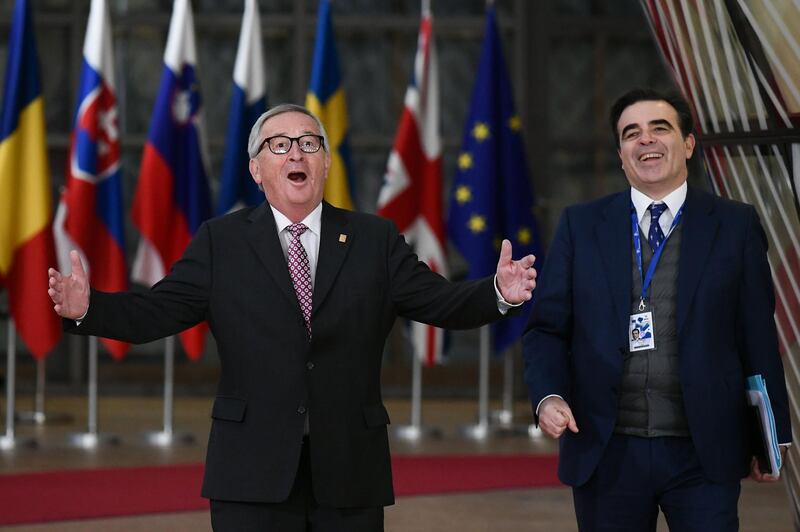UK prime minister Theresa May faces an intensive two-week campaign to persuade MPs to back her vision for Brexit after European leaders signed off on the deal after nearly two years of fractious negotiations.
British lawmakers vote next month on the agreement reached between British and EU negotiators that was rubber-stamped at a short meeting by the remaining 27 leaders of the world’s largest trading bloc in Brussels on Sunday.
Attention now shifts back to the UK where MPs from all parties have indicated their opposition to a deal that EU officials on Sunday insisted was the only one on the table after months of talks between the two sides.
If the MPs fail to back the Prime Minister’s plan, it clears the way for a so-called ‘no deal’ Brexit which is likely to roil financial markets with agreements over over trade, nuclear cooperation, legal agreements and border controls torn up overnight after decades of cooperation.
Mrs May deflected questions about her own position if she failed to convince enough MPs to back her measures and claimed that it was up to parliament to put in place a deal voted for in a 2016 referendum on EU membership.
“The people voted for Brexit. It’s a duty for politicians who asked them to make that choice to then deliver on that choice,” she told reporters in Brussels. “It’s the best possible deal, it’s the only possible deal.”
Reaching an agreement between EU leaders was seen as the easier part of the deal that has to be in place before the UK leaves on March 29, 2019, despite late Spanish objections over the future of the British territory of Gibraltar.
Spanish premier Pedro Sanchez said a late deal strengthened its position with regards to the territory, which borders Spain and which it has long claimed.
The agreement was settled without the presence of Mrs May who arrived in Brussels late on Saturday for talks with senior EU officials and joined leaders of the 27 other member countries later on Sunday after their deliberations.
Donald Tusk, president of the European council, signalled that a deal had been reached in a tweet within half-an-hour of the leaders sitting down in Brussels.
EU27 has endorsed the Withdrawal Agreement and Political Declaration on the future EU-UK relations.
— Charles Michel (@eucopresident) November 25, 2018
The agreement is a key staging point in Britain’s departure after 45 years of often fractious membership of a bloc first established in a continent amid the ruins of the Second World War.
Senior EU officials said the deal was a “sad” moment for both the 28-nation bloc and the United Kingdom, an emotion dismissed by the British leader who supported remaining in the EU before the referendum.
“A country leaving the EU doesn’t give rise to the raising to champagne glasses,” European Commission President Jean-Claude Juncker told reporters. He said the agreement was a “moment of sadness… not a moment of celebration”.
He deflected a question about whether Brexit was still reversible with some MPs and campaigners calling for a second vote on the outcome of the talks. That move has been repeatedly dismissed by Mrs May.
The deal settles the amount the UK must pay to leave the bloc, keeps the Irish border open and protects the rights of UK and EU citizens, said officials. The landmark deal, however, still has to be cleared through national parliaments, with the strongest opposition likely to be in the UK.
____________
Read more:
[ Spain to back Brexit deal after UK agrees to Gibraltar terms ]
[ The moment of reckoning is upon Theresa May as she seeks EU backing for her Brexit deal ]
____________
The agreement has been criticised in Britain by both so-called Remainers and Brexiteers. Former Prime Minister Tony Blair – who has backed continued EU membership - had urged the bloc to reject the plan.
“This is an artifice based on a misguided political fix I promise you we will all regret,” he wrote in the Sunday Times.
From the Brexiteer camp, former Conservative Party leader Iain Duncan Smith said it would be "very, very difficult" to support the Prime Minister's deal arguing "far too much has been given to the EU".
Ministers opposed to the deal are reportedly working on a ‘Plan B’ if the agreement fails to make it through the UK parliament. Officials in Brussels, however, warned that this was the best deal possible for both sides.
Austrian Chancellor Sebastian Kurz, whose country holds the rotating EU presidency, said: “It is important that everyone in the UK is aware that the result that is now available is the result.”
Economists have warned that a no-deal if Mrs May’s plan is voted down would send the pound plunging and lead to long-term economic impact for the UK.
“What really matters now is if May can get it across the line in the parliament because that is what matters the most now,” said Naeem Aslam, chief market analyst of Think Markets UK. “The odds aren’t stacked in her favour for this scenario.”






